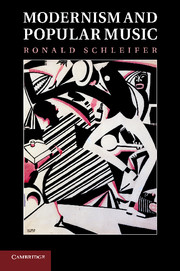Book contents
- Frontmatter
- Contents
- List of Figures
- Preface
- Acknowledgments
- Introduction: popular music and the experience of modernism
- PART I MUSICAL MODERNISM: POPULAR MUSIC IN THE TIME OF JAZZ
- PART II GERSHWIN, PORTER, WALLER, AND HOLIDAY
- Conclusion: popular music and the revolution of the word
- Notes
- Bibliography
- Index
Introduction: popular music and the experience of modernism
Published online by Cambridge University Press: 05 July 2011
- Frontmatter
- Contents
- List of Figures
- Preface
- Acknowledgments
- Introduction: popular music and the experience of modernism
- PART I MUSICAL MODERNISM: POPULAR MUSIC IN THE TIME OF JAZZ
- PART II GERSHWIN, PORTER, WALLER, AND HOLIDAY
- Conclusion: popular music and the revolution of the word
- Notes
- Bibliography
- Index
Summary
This is a book about the “cultural modernism” of the early twentieth century. Part I examines the place of popular music within conceptions of modernism, and Part II examines what I call “the rhythms and semiotics of language and sound” in the music of the Gershwin brothers, Cole Porter, Thomas “Fats” Waller, and Billie Holiday, with occasional references to modernist writers William Butler Yeats, T. S. Eliot, Ralph Ellison, William Carlos Williams, Virginia Woolf, and others. The emphasis of Modernism and Popular Music is primarily linguistic or textual in that I am pursuing an account of how a “revolution in words,” as I note in the Conclusion, transformed or marked the ways in which sensibility, mind, belief, perspective, society, economics, and human experience more generally came to be understood in the early twentieth century. I argue, however, that this revolution, which is usually associated with poets, writers, artists, linguists, and philosophers – as well as twentieth-century composers of “art” music – is just as evident, if not more so, in the work of the great songwriters and jazz performers who came to prominence in the United States between the two World Wars. These artists did not merely reveal the basic contents of this shift in how the world was (or could be) comprehended or “felt.” Rather, in their role as “alchemists of the vernacular,” as Alfred Appel has described them, they opened up a powerful social space through which fundamental problems of equality, difference, desire, reason, authority, self, and language were not merely expressed, but questioned and negotiated.
- Type
- Chapter
- Information
- Modernism and Popular Music , pp. 1 - 26Publisher: Cambridge University PressPrint publication year: 2011



